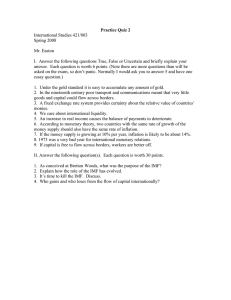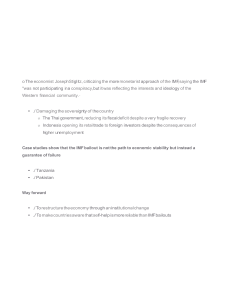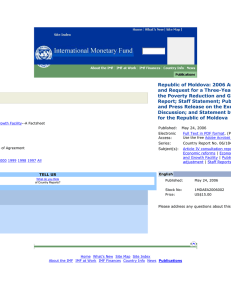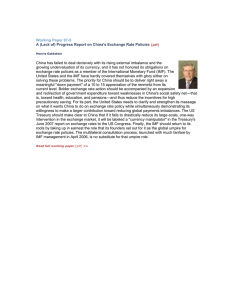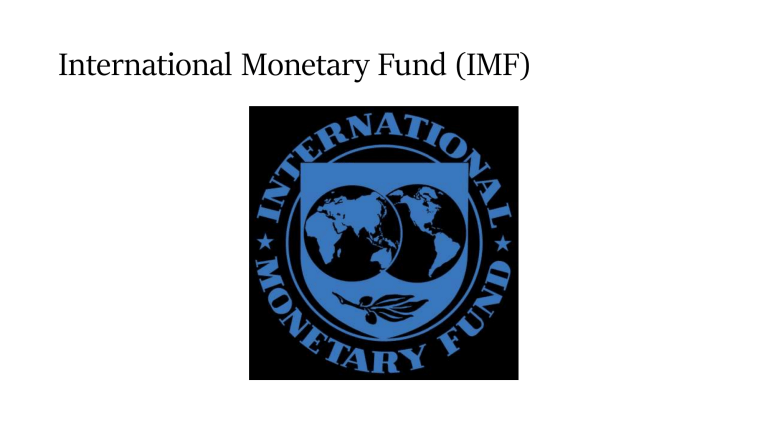
International Monetary Fund (IMF) International Monetary Fund (IMF) • The International Monetary Fund (IMF) is an international organization that aims to promote global monetary cooperation, secure financial stability, facilitate international trade, promote high employment and sustainable economic growth, and reduce poverty around the world. The IMF provides financial assistance, policy advice, and technical assistance to member countries to help them improve their economic development and human welfare. Ways in which the IMF supports countries to improve economic development and human welfare: Financial Assistance Programs: The IMF offers financial assistance programs to member countries facing balance of payments problems or economic crises. These programs are designed to stabilize economies, restore confidence, and facilitate the implementation of necessary reforms. Financial assistance can come in the form of loans or credit arrangements that are often linked to specific policy conditions aimed at addressing economic imbalances. Policy Advice: The IMF provides member countries with economic policy advice based on its expertise and analysis. This advice covers a wide range of issues such as fiscal policy, monetary policy, exchange rate policies, structural reforms, and more. This guidance helps countries formulate effective policies to achieve sustainable economic growth and stability. Technical Assistance and Capacity Building: The IMF offers technical assistance and capacity-building programs to member countries, particularly to strengthen their economic institutions and policymaking frameworks. This includes assistance in areas such as tax administration, public expenditure management, central banking, financial sector supervision, and statistics collection. Strengthening these capacities helps countries make informed policy decisions and manage their economies more effectively. Research and Data Provision: The IMF conducts economic research and analysis on various global and regional issues. It publishes reports such as the World Economic Outlook and Global Financial Stability Report, which provide valuable insights into global economic trends and risks. The IMF also collects and disseminates economic and financial data, which helps member countries monitor their economic performance and make informed decisions. • Support for Sustainable Development Goals (SDGs): The IMF aligns its programs and policies with the United Nations' Sustainable Development Goals (SDGs). It provides advice to member countries on how to incorporate the SDGs into their economic policies and development strategies. • Promotion of Inclusive Growth: The IMF encourages policies that promote inclusive growth, which focuses on ensuring that the benefits of economic development are widely shared across all segments of society. This includes addressing income inequality and creating opportunities for marginalized groups. Capacity Development Programs: The IMF offers training and capacity development programs for policymakers, economists, and officials from member countries. These programs provide participants with the skills and knowledge needed to design and implement effective economic policies. Safeguarding Social Spending: In its policy advice, the IMF often emphasizes the importance of protecting social spending and vulnerable populations during periods of economic adjustment. This is to ensure that necessary reforms don't disproportionately affect those who are already marginalized or economically disadvantaged. This Photo by Unknown author is licensed under CC BY-SA-NC. In conclusion, the International Monetary Fund (IMF) stands as a vital pillar in the global effort to promote economic development and enhance human welfare. Through a multifaceted approach involving financial assistance, policy advice, technical support, and capacity-building programs, the IMF assists member countries in addressing economic challenges, fostering stability, and pursuing sustainable growth. By aligning its strategies with the Sustainable Development Goals and advocating for inclusive growth, the IMF strives to ensure that economic progress benefits all segments of society. While debates persist regarding the impact of its conditions and policies, the IMF's commitment to guiding nations toward prosperity remains an essential force in the international arena. As the world continues to navigate complex economic landscapes, the IMF's role as a catalyst for positive change remains as significant as ever, shaping a more resilient and equitable global economy. This Photo by Unknown author is licensed under CC BY.
